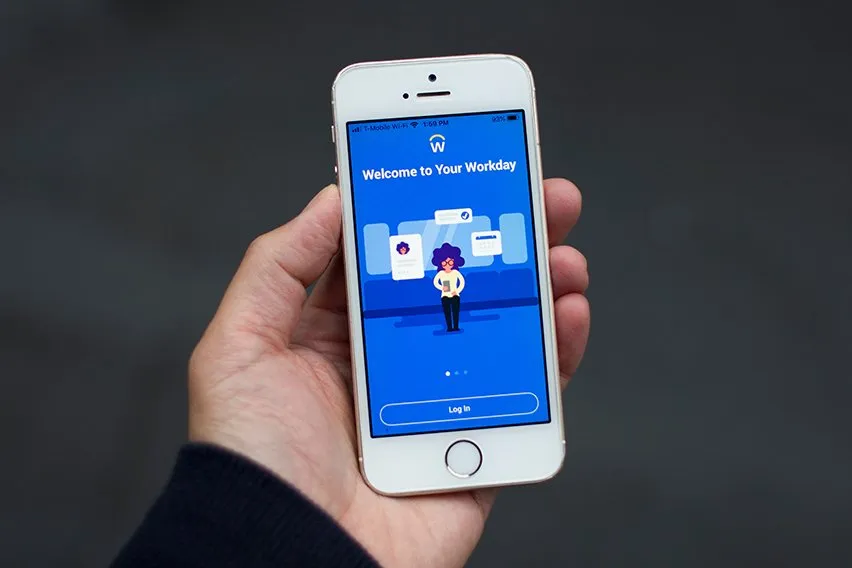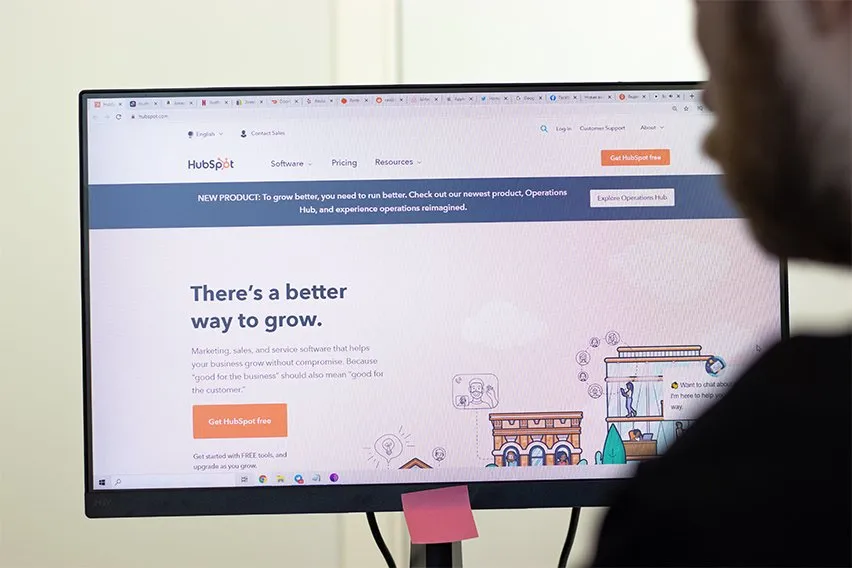10 Best Collaboration Software for 2025 in Canada

Creating a strong team is one of the most important parts of running a successful business. And once you have a great team together, it’s all about setting them up for success with great collaborative tools. Modern business environments depend on collaboration software to enhance communication, streamline teamwork, and drive productivity across the board—but how do you find the right one for you? – Here’s everything you need to know.
Table of Contents
- FreshBooks
- Slack
- Asana
- Miro
- Airtable
- Trello
- Podio
- Basecamp
- Monday.com
- Flock
- Collaborative Software Comparison Table
- Frequently Asked Questions
Each collaborative software has distinct pros, cons, and unique features. Let’s break down what to know about the top 10 collaboration tools. Prices are approximate and subject to currency fluctuations.
1. FreshBooks
FreshBooks offers the best overall collaboration apps, helping to bring the many parts of your business and work into one simple interface. FreshBooks makes it easy to create blended project groups of employees, business partners, and contractors, helping to keep each job on track. You can upload and selectively share files of all kinds and use the quick, handy, built-in messaging feature for those quick questions and updates. FreshBooks’ collaboration software is the best all-around tool to keep your team on track.
Features
- Invite contractors, business partners, and team members into project groups
- Set custom file access permissions for each project member
- Secure, cloud-based, centralized file storage
- Private chat and project status updates
- Assign costs/billable rates to specific clients and projects
- Track job profitability at a glance
- Assign and track cost rates to manage team labour
- Seamless integration with other FreshBooks features:
- Time tracking to manage billable hours and staff labour costs
- Expense tracking to help keep projects on budget
Pricing
FreshBooks’ online collaboration tool is one of the most affordable on the market. After your 7-day free trial, you can access this tool for just $60 CAD a month for the Premium plan.
2. Slack
Slack is one of the most popular business collaboration software options out there, and for good reason. It’s a workhorse for business communications, used by small businesses and huge corporations alike. It offers a handy, easy-to-learn interface, a great mobile app, and plenty of helpful features that many businesses rely on daily.
Advantages
- Fast, secure, easy-to-use messaging features
- Sub-channels allow you to separate communications for certain topics, projects, and teams
- Automation feature allows customizable, automatic reminders for important dates
- Integrations to help incorporate Slack into existing workflows
- Audio/video meetings
Drawbacks
- Threads and channels can get disorganized easily
- Relatively low file size limit for uploads
- Troubles with smoothly inviting guests or new member to channels
- Poor collaboration abilities between multiple workspaces
Pricing
Slack offers a ‘freemium’ option of $0 a month indefinitely with limitations to functionality. Paid plans can exceed $12.50 USD per user per month when billed annually.
3. Asana
Asana is a preferred web-based collaboration software. It makes it easy to assign, track, and provide updates on projects, allowing you to break them down into easy pieces in a to-do list format. Set due dates, leave comments, attach files, and provide updates on the go with this handy tool.
Advantages
- Very simple features to assign and delegate tasks
- Centralized location for to-dos and project information
- Handy comment tool to allow quick notes and communication
- File upload on tasks for supplementary info
- Well-made mobile app for work on the go
Drawbacks
- The software can take a little more time at first to fully learn
- Search tool isn’t always useful, especially on mobile
- When assigning tasks, it can be easy to make a mistake when entering details, leading to miscommunications
Pricing
Asana offers a free trial. Afterwards, pricing ranges from $18.64 to $27.63 CAD per user per month.
4. Miro
Offering a user-friendly, visual-first format to project management, Miro is one of the more popular real-time team collaboration tools. It’s especially popular for creative teams and project managers on the client-facing side, allowing businesses to loop clients into project oversight, provide visual aid for pitches, and keep everyone up to speed on a project’s roadmap to completion.
Advantages
- Plenty of built-in templates for project visualizers
- Handy real-time collaboration tools for status updates
- Sticky note and annotation features make it easy to add info and ask questions
- Useful reporting functions for deeper insights
Drawbacks
- No ability to save custom templates
- Sluggish loading times for larger project boards
- Virtually no customer support
- Tag feature is considered subpar compared to competitors
Pricing
Miro offers an unlimited duration free version, though capabilities are quite limited. Paid plans range from $11.05-$22.10 CAD per user per month.
5. Airtable
Offering an easy-to-read interface with project info laid out visually, Airtable is one of the best collaboration tools for businesses. Whether you need in-depth project management, event planning tools, a structure for content pipelines, or a foundation for your user research, Airtable can help.
Advantages
- Customizable appearance allows you to hide unneeded information without deleting it
- Easily update data into different kinds of visualization formats
- Quick and easy to configure and use
- In-depth details for each project (due date, assignee, etc.)
Drawbacks
- Tutorial features are limited, making it hard for newcomers to learn
- Automation features are clunky and hard to use
- Graph and chart customization is very limited
- Many features are locked behind progressive paywalls
Pricing
Airtable plans begin at $13.81 CAD per user per month and can range beyond $27.63 CAD per user per month, depending on the features you want to pay for.
6. Trello
Look no further than Trello for a no-fuss small business collaboration tool. Offering a clean layout, an impressive list of app integrations, detailed task breakdown features, and an intuitive user interface, Trello is another favourite, particularly among companies that work remotely.
Advantages
- Easy task management thanks to the simple layout
- Intuitive drag and drop controls
- Flexible customization for workspace controls
- Useful visualization tools
- Good for breaking down and delegating subtasks
Drawbacks
- Tags are fixed, meaning you’ll need to redo some work if you need to make a change
- Tasks are limited to a single project
- Subtask hierarchy is limited
- Lacklustre reporting and privacy options
- Limited integrations and attachment options on the free version
Pricing
Trello offers a very limited Forever Free package for basic management purposes. Paid plans from $17.27-$24.18 CAD per user per month.
7. Podio
As an all-around project management software, Podio is a top choice for those who value in-depth insights and functionality. It’s useful for team communication, project planning, content pipelines, and sales processes, as well as managing labour, budgets, and other key figures in real time.
Advantages
- Customizable app integrations give you plenty of workflow options
- Basic version is completely free, giving you time to try it out
- Clean user interface makes it simple to learn
- Custom templates save time on daily tasks
Drawbacks
- Very limited rollout of new features and integrations
- Can be hard to get data, reports, and tasks smoothly working between different apps
- Platform is often slow and sluggish to load
- Frequent downtime
Pricing
Podio offers a free version for up to 5 employees. Paid plans range from $15.47 CAD per user per month to $26.52 CAD per user per month when billed annually.
8. Basecamp
This web-based collaboration app is a simple project management tool, offering most of the features you’d expect along with a well-designed mobile app, unlimited users on a project, and a solid list of third-party app integrations. Founded in 2004, Basecamp is one of the longer-running online collaboration tools on this list.
Advantages
- Fairly straightforward, making it easy to use for clients and new team members
- Solid user permission functions to separate what each project member sees
- Customizable automatic updates and reminders to help your team stay on track
- Streamlined task management system
Drawbacks
- Limited tags to manage projects and subtasks
- Rigid structure makes it hard to adapt Basecamp to specific project needs
- Subpar deadline reporting features
- Limited functionality on mobile
Pricing
Basecamp offers just two plans: a standard version, which allows 5 users for $15 USD per month, per user, and a Pro plan with unlimited users for $299 a month when billed annually.
9. Monday.com
Monday.com is a popular project management app thanks to its open design and modular style of customization. Offering extensive integrations, it’s great for sales pipelines, marketing campaigns, CRMs, and standard project management.
Advantages
- Project boards are highly customizable and easy to adapt
- Automated functions speed up basic tasks and save time daily
- App integrations allow you to integrate the platform into your existing workflow with ease
- Data is easily transferred between boards
- Handy templates built-in as a starting point
Drawbacks
- In its effort to work for all purposes, can sometimes be lacking for specific types of tasks
- Many features locked behind pricing jumps
- Viewing boards of other members can be cumbersome
- Difficult for many to learn at first
Pricing
Monday.com offers a very feature-light freemium version for $0 a month. Paid plans range from $11.05-$13.81 CAD per user per month for the full features list.
10. Flock
Designed to compete directly with Slack, Flock is a corporate messaging platform designed to speed up communication and collaboration throughout your work day. It offers task management, workflow automation, file sharing, and all the communication features you’d expect from other online collaboration tools.
Advantages
- Cloud-based file upload makes it easy to centralize important resources
- Voice calling for quick check-ins and chats
- Subgroups allow you to communicate in smaller teams as needed
- Well-designed mobile app
- Fast, reliable real-time communication
Drawbacks
- Search functionality is sometimes not as useful as it should be
- Limited customization of user interface
- Convoluted to-do app integrations
- Calling feature is very basic compared to alternatives like Slack
Pricing
Flock does not offer a free trial or free version, and they bill as a one-time fee versus on a subscription basis. Plan charges range from $345.37 to $759.81 CAD, depending on the number of users you’ll need to accommodate.

Collaborative Software Comparison Table
Looking to compare the 10 project management tools at a glance? Here’s everything you need to know.
| Company | Best For | Starting Price |
| FreshBooks | Best for Small Businesses | Free Trial |
| Slack | Best for Features and Integrations | CA$10.01 (Billed annually)USD$7.25 |
| Asana | Best for Workflow Management | CA$17.27 (Billed annually)USD$12.64 |
| Miro | Best for Whiteboard Collaboration | CA$11.05 (Billed annually)USD$8.00 |
| Airtable | Best for Database-Driven Collaboration | CA$13.81 (Billed annually)USD$10.00 |
| Trello | Best for Kanban-Style Collaboration | CA$17.27 (Billed annually)USD$12.64 |
| Podio | Best for Customized Workplace Hubs | CA$15.47 (Billed annually)USD$11.20 |
| Basecamp | Best for Balancing Work and Communication | CA$20.49 (Billed annually)USD$15.00 |
| Monday.com | Best for Startups on a Tight Budget | CA$11.05 (Billed annually)USD$8.00 |
| Flock | Best for Sales and Marketing Teams | CA$345.37 (One-time fee)USD$250.00 |
What is Collaboration Software?
Team collaboration tools are simply any app or online tool that helps you coordinate projects and subtasks with the rest of your team members. This can range from sharing data in visualized reports to quick chats between coworkers to extensive pipelines of tasks, subtasks, and delegation. Regardless of your choice, look for solid app integrations (bonus points if they support apps your business already uses), a clean user interface, and reliable security standards.

Still curious about choosing the best online collaboration tools for you? Learn more through these frequently asked questions.
What is a real-time collaboration tool?
A real-time collaboration tool is software that allows you to communicate with your team. This can range from messaging tools like Slack or Flock to project management such as Trello or Asana. A platform with all-around collaboration features like FreshBooks is a great option for those needing something more comprehensive.
What is team collaboration software?
Team collaboration software is designed to make completing projects with your team easier. The software is usually broken down by projects and subtasks and allows you to quickly delegate specific jobs to other members, update completion status, and track deadlines.
Why do companies need a collaboration system?
A real-time collaboration system helps companies manage their daily tasks and overarching projects. It’s essential to have a good system, especially for remote companies that don’t have the chance to touch base in face-to-face meetings. These tools help you avoid miscommunication, work more quickly, and finish jobs punctually.
How do I choose the best collaboration tool?
To choose the best collaboration and communication tools, it’s recommended to balance the specific features you need, the ability to scale and adapt according to your work needs, and, of course, the price. If you’re looking for a great all-around option, consider trying the free trial for FreshBooks.
What is the most popular workplace collaboration tool?
One of the most popular workplace collaboration tools currently on the market is FreshBooks Collaboration, which offers an extensive features list and seamless integration with our time tracking, expense tracking, and other accounting features.
Team Up and Get More Done with FreshBooks
Working with your team doesn’t need to be tricky. When you supply a great team with the right tools, collaboration and communication quickly become how business is done, helping you finish each project with the precision you need. The FreshBooks Collaboration app is an exemplary tool for enhancing your team’s productivity and overall workflow. Try FreshBooks free today!
Reviewed by
Kristen Slavin is a CPA with 16 years of experience, specializing in accounting, bookkeeping, and tax services for small businesses. A member of the CPA Association of BC, she also holds a Master’s Degree in Business Administration from Simon Fraser University. In her spare time, Kristen enjoys camping, hiking, and road tripping with her husband and two children. In 2022 Kristen founded K10 Accounting. The firm offers bookkeeping and accounting services for business and personal needs, as well as ERP consulting and audit assistance.
RELATED ARTICLES


 10 Best Project Management Software for 2025 in Canada
10 Best Project Management Software for 2025 in Canada What Are Profitability Ratios? Definition, Types & Importance
What Are Profitability Ratios? Definition, Types & Importance 5 Best Client Intake Software for Law Firms
5 Best Client Intake Software for Law Firms Project Coordinator Vs Project Manager: What’s the Difference?
Project Coordinator Vs Project Manager: What’s the Difference? 10 Best Project Scheduling Software
10 Best Project Scheduling Software The 9 Best Contact Management Software Tools
The 9 Best Contact Management Software Tools